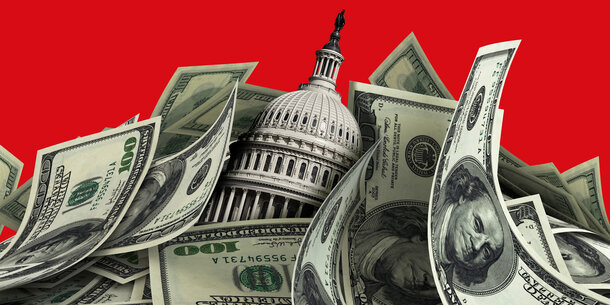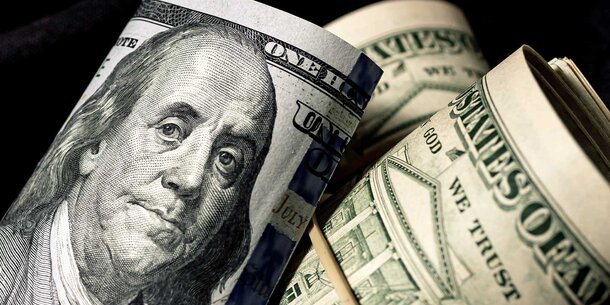Election denial is fueled by lies, polarization — and money. In many races, wealthy donors have exploited weak and poorly enforced campaign finance laws to boost the efforts of election deniers.
A legislative race in the battleground state of Wisconsin offers a telling example. After the state’s GOP assembly speaker, Robin Vos, rebuffed calls to decertify the state’s 2020 election results, he faced a 2022 primary challenge from an election denier, Adam Steen. Last month, the state’s bipartisan ethics commission found that Steen’s campaign coordinated with local election deniers, county parties, and Donald Trump’s Save America PAC in an effort to illegally bypass state campaign contribution limits.
Wisconsin law prohibits individuals from contributing more than $1,000 per election cycle to any assembly candidate. But thanks to a 2015 change in the law, there is no limit for donations to political party committees, which in turn can make unlimited donations to candidates. It is illegal for people to take advantage of that by coordinating with party committees to route their donations to a particular campaign, but proving such a conspiracy in court is usually difficult. Prosecutors must now decide whether to bring criminal charges, which have been recommended by the bipartisan ethics commission.
The scheme to funnel money to Steen was particularly blatant. According to an investigation authorized by the commission, Steen’s campaign struck up arrangements with State Rep. Janel Brandtjen (R), a vocal election denier; Save America PAC; and three county GOP organizations to disguise individuals’ donations as having come from parties.
Potential donors were informed that by sending checks to the Langlade County Republican Party and earmarking them with Vos’s district number, their money would be forwarded to the Steen campaign — a clear violation of state law. The evidence includes county GOP meeting minutes, checks, interviews by investigators with those involved, and at least one recorded conversation.
The roots of this scandal go back to 2015, when then-Gov. Scott Walker (R) and the state legislature, led in part by Vos, significantly deregulated state campaign finance laws and gutted enforcement. Among other changes, they eliminated existing limits on individual contributions to parties and on party contributions to candidates. At the time, Vos claimed the reforms would make it “easier to participate in democracy” and protect “a free and vigorous debate.”
That same year, the governor and legislature dissolved the state’s highly regarded Government Accountability Board, which advocates and scholars had lauded as a national model for nonpartisan ethics and elections oversight. It was replaced by two evenly divided bodies: the Wisconsin Elections Commission, which frequently deadlocks along party lines, and the lower-profile Wisconsin Ethics Commission, which faced criticism from the start for lax enforcement. In 2018, an audit by the ethics commission uncovered signs of potential systemic underenforcement of lobbying rules.
Wisconsin’s situation may sound familiar to observers of the federal campaign finance system, in terms of both how its enforcement body lacks potency and the antidemocratic politics it has helped empower.
More than a decade after the Supreme Court’s decision in Citizens United enabled a drastic increase in political spending by wealthy individuals and corporations, super PACs and campaigns do everything they can to evade laws that prohibit coordination, and big donors can often avoid scrutiny. Part of the problem is that the oft-deadlocked Federal Election Commission, composed of equal numbers of Republicans and Democrats, has often failed to properly enforce campaign finance regulations.
In the 2022 election cycle, donors who had previously helped fund challenges to the 2020 election results gave millions of dollars to election-denying candidates for federal and state office, including for offices that oversee elections. Their efforts were buoyed by super PACs’ ability to accept unlimited individual contributions.
This cycle, at both the federal and state levels, unaccountable dark money groups like the Honest Elections Project continue to cultivate a network of election officials who support antidemocratic policies. And individual big donors like billionaire couple Richard and Elizabeth Uihlein, who financially supported election deniers’ campaigns and groups tied to the January 6 insurrection, continue to take advantage of lax regulation. Elizabeth Uihlein recently donated $2 million to Wisconsin’s Republican Assembly Campaign Committee — which, thanks to the state’s 2015 campaign finance deregulation package, can receive unlimited contributions from individuals.
What is striking about the ethics commission’s findings is that, in an already permissive environment, the alleged conspirators appear not to have even made a pretense of following the law. Wealthy donors who exercise a bit more care can successfully exploit loopholes and gridlock to funnel money to whomever they choose.
The solutions necessary to stop this are clear: sensible individual contribution limits that cannot be easily circumvented, strong enforcement by independent bodies with meaningful decision-making capabilities, and a public campaign financing system that lifts up the voices of ordinary Americans.
At the federal level, many of these reforms are part of a crucial pro-democracy bill, the Freedom to Vote Act, which would also set national baseline standards to protect the integrity of the electoral process. States are not waiting for Congress to act: last year, Minnesota passed a landmark set of voting and campaign finance reforms and New York took important steps to implement its new small-donor matching program.
For its part, Wisconsin recently replaced gerrymandered legislative maps with fair ones. That could be a harbinger of future reforms, including better regulation of money in politics. Ordinary people who can’t donate thousands of dollars per election would benefit.
Correction: An earlier version of this article stated that it was Trump’s 2024 joint fundraising committee, Save America, that was involved in the scheme. It was actually Trump’s political action committee, which is also called Save America.



